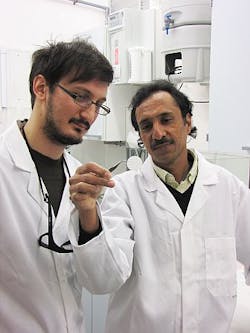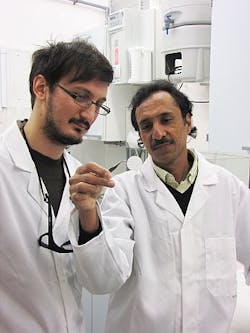Development of laser-printed biosensor for cancer screening garners $370K grant
Researchers at the Optoelectronics Research Centre (ORC; Southampton, England) are working to develop laser-printed biosensors that can be used to detect biomarkers in cancer patients and monitor response to their chemotherapy treatment. What's more, the research team has been awarded over $370,000 (£230,000) in funding from the Engineering and Physical Sciences Research Council (EPSRC; Swindon, England) to explore whether laser-induced forward transfer (LIFT) printing of biological materials can be used to develop the sensor device on paper.
Related: The many approaches and applications of biosensing
The biosensors would allow transfer of valuable clinical diagnostic information between patients and their care team through the use of mobile phones. The personalized tests will be possible while maintaining security and anonymity of their results through laser-printed 2D barcodes of biological material that change color depending on the result.
"The paper-based sensors would enable diagnosis at an early stage, from a patient's bedside in the comfort of their own home, without the need for either specialized equipment or trained medical personnel," explains senior research fellow Dr. Collin Sones. "This research is a very important step for the ORC. It is a completely new area for us and is the beginning of our collaborative cross-disciplinary work with our colleagues in Medicine and the Institute of Life Sciences. Once we prove that laser printing works, and we can develop a paper-based sensor, then this has the potential to revolutionize medical treatment as the technology can be used to make devices for a whole range of other conditions."
The biomarkers for breast cancer have already been identified and validated in a pilot study by academics in Medicine and the Institute of Life Sciences. They are now being used to study the response of patients receiving chemotherapy.
If successful, these paper-based sensors would prove invaluable in rapidly testing for detection and diagnosis of conditions, including cancer and infectious diseases such as influenza, HIV, and tuberculosis. They would enable rapid testing for these conditions in a safe, inexpensive, and flexible way that would have enormous benefits in time, cost, and improvement of patient care.
The research will continue over the next 18 months.
For more information, please visit http://www.orc.soton.ac.uk/lift.html.
-----
Follow us on Twitter, 'like' us on Facebook, and join our group on LinkedIn
Subscribe now to BioOptics World magazine; it's free!

